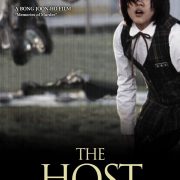Literature & Environment Film Series, “Eco-Horror and the Revenge of Nature” on Nov. 9th

In Bruno Latour’s words, people are ill equipped emotionally and mentally to deal with the scale of environmentally destructive events in the Anthropocene. Eco-horror has historically grappled with the terrors of scale, from a classic concern with mutant creatures who teach humanity a lesson about tampering with nature to the contemporary fascination with and dread of nature as an all pervasive, inescapable force that reworks the human body and mind now that we have changed everything by geo-engineering and recomposing the material world from the level of the molecule to the atmosphere.
In an age of supposed technological mastery over nature, an epoch during which humans supposedly exert a total global reach over nature (a feat desired at least since the Enlightenment), how does Eco-Horror capture the way Western culture psychologically processes the “pushing back” of materiality, the sensation of “nature biting back” as mass species extinctions, global climate change, etc.? Eco-horror represents this recalcitrant materiality as collective anxiety and desire. The genre figures our unconscious knowledge that the feeling of domination civilization has given us is a delusion: “Behind our need for mastery lies our fear and trembling in the face of the awesome power of mother nature” (Joseph Dodds) and our secret “hope that she will [n]ever be entirely subdued to man” (Freud).
Eco-Horror rehearses the communal desire to dominate a feminized nature in order to assert our human subjectivity and rationality. On the other hand, the genre expresses an underlying masochistic impulse to relinquish our autonomy by dissolving in nature’s power and dwelling in the wilds of the leaky id by deploying perceptual (affective) and aesthetic technologies that undo gender, race, and species. As a part of this series, we will consider whether Eco-Horror’s transmission of affect contributes to more destruction, violence, and political apathy? How does the genre update the trope of the feminized nature from early colonial narratives to a newly reanimated corpse-mother aesthetic that represents our collective fear of and desire for this new cyborg-like nature? The goal of the series is to explore how contemporary Eco-Horror cinema rehearses the gender/race/species politics as an incongruity between a faith in human evolution and a fearful sense of wish fulfillment regarding the possibility of human degeneration, thereby bringing to crisis the unconscious guilt and hope that the social and environmental damage is reversible.
[easy-share buttons=”facebook,twitter,linkedin,mail” counters=0 native=”no” image=https://live-ehc-english-ucsb-edu-v01.pantheonsite.io/wp-content/uploads/2014/11/yusuke-asai-waf-1.jpg url=https://live-ehc-english-ucsb-edu-v01.pantheonsite.io/?p=13646 facebook_text=Share twitter_text=Tweet linkedin_text=Link text=”Upcoming UCSB US-China Forum on Climate Change featured in the Santa Barbara Independent.”]




Leave a Reply
Want to join the discussion?Feel free to contribute!